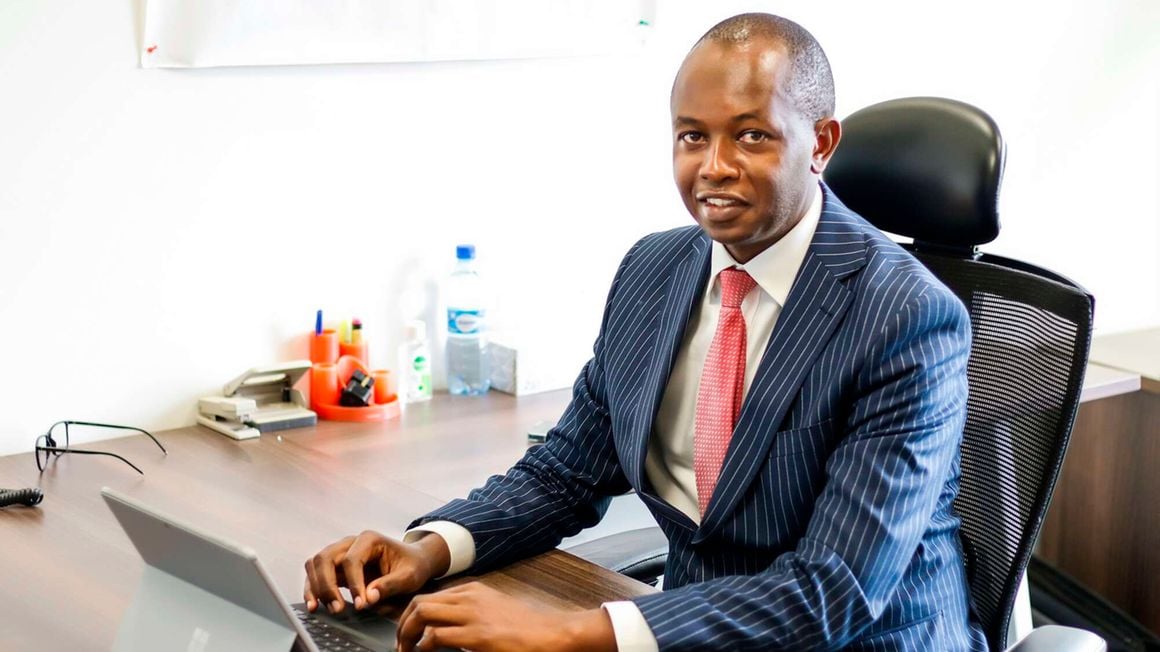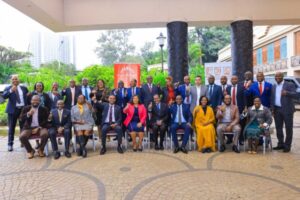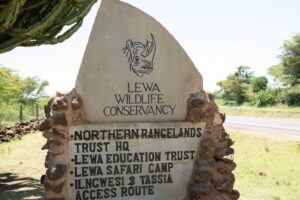He possesses the stature of a tall man but carries the countenance of a youthful boy. On one occasion, he encountered a group of significantly older, conventionally attired businessmen within a boardroom setting.
In an interesting turn, these gentlemen requested his assistance in serving them tea while awaiting the arrival of Mr. Kenneth Mbae.

Without hesitation, he obliged their request by serving tea, only to later reveal his identity as none other than “Mr. Mbae.”
Now at the age of 36, Kenneth holds a Bachelor of Science in Biochemistry from Kenyatta University and is also an alumnus of Harvard University (AMDP XVIII).
His current endeavors decidedly diverge from those characteristic of youthful ventures. Particularly noteworthy is his role in the conversion of a Sh5.5 billion asset, primarily a sisal plantation, into a thriving Sh20 billion enterprise during his tenure as the managing director at Vipingo Development.
His earlier appointment as deputy managing director at Athena Properties, responsible for the completion of Two Rivers Mall, further highlights his accomplishments.
Presently, he leads Centum Real Estate in the capacity of Managing Director.
He asserts, “The key to garnering genuine respect lies in one’s ability to deliver, irrespective of any youthful appearance.”
How was your childhood?
Just a normal childhood, the best parents can provide. I grew up around the Mount Kenya region in Nanyuki.
I went to the local public primary school and, in Class Five, went to a Catholic boarding school, Our Lady of Visitation in Timau.
I had three siblings, and we grew up with our cousins. My mum worked at a lawyer’s office. My dad was a teacher.
Why did you go to boarding school so early?
It was what parents around my neighbourhood preferred. They believed that boarding school promotes a greater sense of responsibility and the probability of better academic performance was higher. All my friends had gone, so I was also eager to go.
During the first term, I highly regretted the decision. I was homesick, I cried whenever I was alone, but being a boy, I couldn’t be seen crying. So I learned how to survive on my own. And with time, I become self-disciplined. Then I went to high school, still in the Mount Kenya region.
Then to Kenyatta University (KU), where I did Biochemistry. While at KU, I did a management certificate and diploma at the Kenya Institute of Management. After graduation, I joined Centum as a graduate trainee. I did all manner of work, including a charging parking attendant.
Charging parking?
Yeah, Centum had a plot where Utalii House sits. I was there as a cashier. We were trying to generate revenue out of that idle space.
After that, I went to the office and started doing rotations in every department. When I got to real estate, I felt at home. I like real estate.
What did you like about real estate?
It’s very similar to biochemistry in that it requires understanding how every component works. I was doing a lot of research, which I enjoyed.
I don’t think between 2010 to 2014 there was a Centum development that I never visited just to find out how everything works.
In 2010, when Two Rivers Mall land was acquired, I was put in charge of fencing and knowing the property boundaries. Where we sit today was a Napier grass plantation.
I also used to plant trees around the perimeter fence and the rivers. So I was the guy being sent to the ground.
That’s fascinating.
Yes. I was also the archives guy. I knew where every file was, including the engineering reports. I was the go-to guy. With a project like that, you start with the market studies. When the feasibility studies were being done, I would accompany the guys.
Then to validate those assumptions, you need to understand the market better than them (researchers) so that you can tell if they are giving you the correct data. I visited many offices in my knowledge quest.
What dreams did you have?
I just wanted to be successful. I wanted to be like my grandfather, who was successful by his standards. He was in business – buying and selling land and commodities.
He was semi-illiterate but a great business person. Even though I never met him, he influenced my life from a young age. He passed on before I was born. I’m named after him, Gitonga, which means a rich man in my Meru community.
We believe that you emulate the traits of the person you are named after. So I just thought one day I would be successful.
Would you take your children to boarding school at the age you went to school?
No! (Chuckle). Times are different. With what is happening in the world today, you need to spend more time with them, mould them.
When you have an office like this, towards the top of the food chain, do you find that you struggle to make time to be a dad?
I’m not at the top, yet. I’m demonstrating the potential to go to the top. I was fortunate to join Centum, an organisation with good growth. Now, you cannot delegate being a dad. You have to create time; it doesn’t matter how.
And your children don’t care what you do because you are just their dad to them. So when they need you in the evening to be crawling with them, you have to be there crawling and doing homework. You have to create time.
And all the success and hard work you’re doing is for them. So I’ll be with them for 10 years. Maybe at 16, they’ll go to the world. So I can sacrifice 10 years.
I will be left with the balance of the years to be on my own. I struggle with balancing allowing the child to make decisions to explore and limiting them to protect them.
By shielding them, you’re not allowing them to take the risk they should. And, of course, you have high expectations of them.
You want them to be the best in everything, but they can only be the best if they are out to explore. My parents were uncompromising on discipline, and I am just as strict.
What are some of the things that occupy your mind now at 36?
I have a family that is accustomed to a particular lifestyle. I have a career that has given me a particular profile. I have many more years ahead.
How do I sustain what I have but also grow and make a difference? What skills must I have? Because the only thing that cannot be taken away from you is skill, money, and titles, can go.
One day you retire. If you retire, what happens? Can you sustain what you gave your family? Can you nurture the skills that you have? Can you grow? I’m more preoccupied with personal growth and the skill set I need.
What are you insecure about?
Poverty. [Chuckle. I don’t fear failure because I think I fail every day. I wake up here with a plan to do many things, and sometimes I barely accomplish them.
And sometimes, when I do some, they fail terribly. But out of the 10 things I do, if six are okay, that’s okay. But that failure of ending up with nothing makes me sleepless.
You have a very boyish face. How does that play with the kind of position you are in?
Sometimes when I go for meetings with guys in their 50s and 60s who have never met me, they tell me, “kijana tuekee chai.” [Laughs].
So then I have to quickly wonder if I should tell them I’m Mr Mbae. Usually, I just serve tea and later introduce myself, and they say, “Aah mbona ulitufanya tuvae suti!” [Laughs].
I’m used to people discounting me for my age. It doesn’t impact me. People will take you seriously when you have content and can deliver, no matter how young you might look.
How did you know that you were going to marry your wife?
Is there a man who prepares to get married? Are there men who say, “Next year, I will get married?” You find someone you like, become friends, and go through courtship.
What I liked about my wife was that she was arrogant and just not interested in me. That and I could see that she would make a good wife. So I pursued her until she became interested.
Describe your 40s, how you envision them in your mind.
You asked what I’m worried about. That typically starts in the 40s. I’ve observed things go horribly wrong for various successful men when they reach their 40s. They either end up bankrupt, with no family or with no jobs. I don’t know why. I hope that by 40 I will have grown this business and advanced myself significantly from career and personal development perspectives.
Which personal trait do you least like?
That’s a tricky question. [Pause] I lose interest quickly. When I’m disappointed, you can actually tell. It shows on my face instantaneously. I wish I could do the mature thing of being poker-faced, not allowing my body to speak for me.
What gives you the most pressure now?
It’s just that enormous responsibility I have. First for my family, second for myself, and the company. The company’s shareholders must get a return, and bankers must get their capital back. Employees must be motivated and incentivised. And now look at the market; there’s no money.
It’s a lot of pressure, and time doesn’t seem adequate, so I have to prioritise and focus on things that move. There are many things to be done, but I can’t finish all of them now, so I prioritise the most impactful.



















